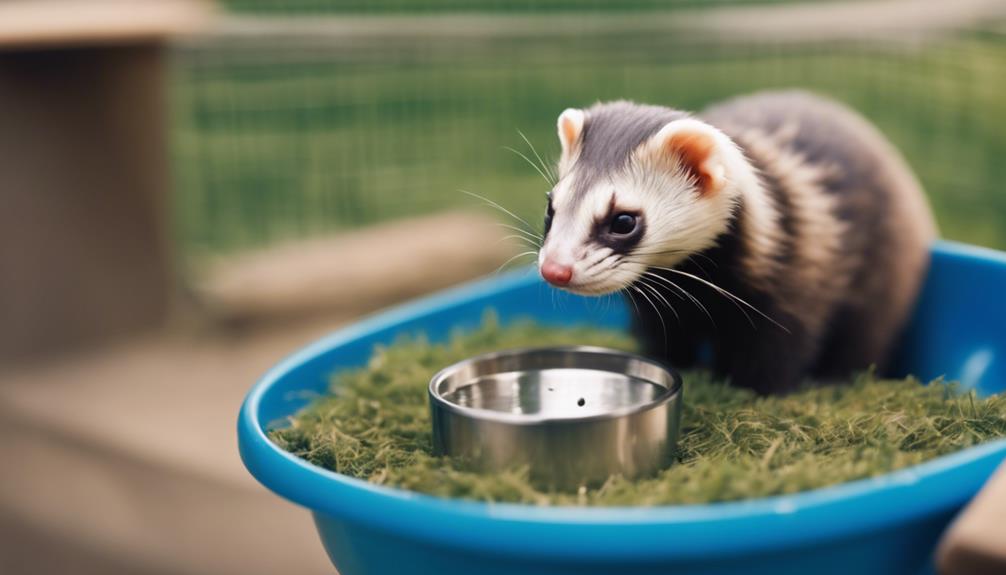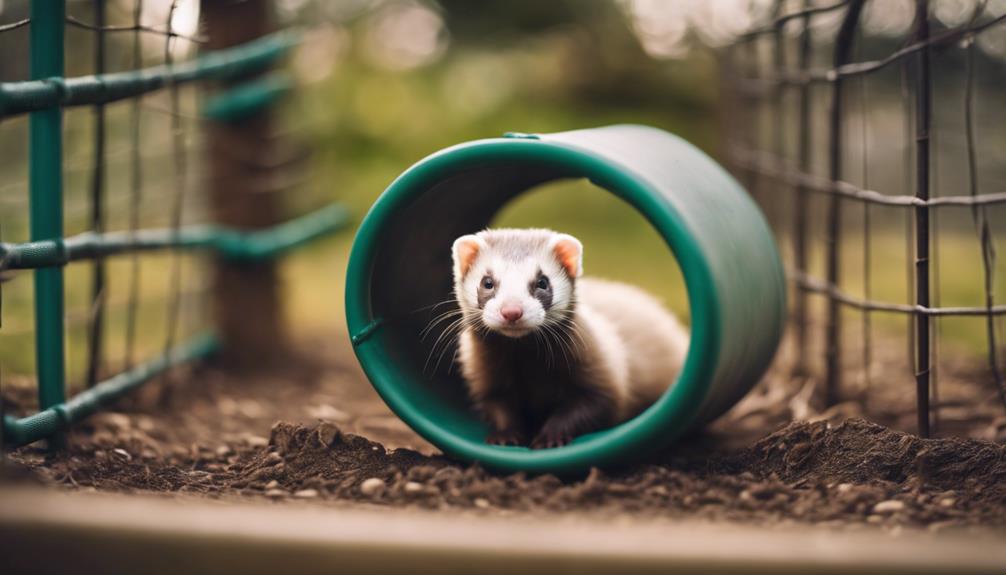How to Set Up an Outdoor Play Area for Ferrets

When setting up an outdoor play area for ferrets, there are several essential steps to follow to create a stimulating environment for your pets.
- Choose a safe and secure location for the play area, preferably a fenced-in space to prevent escapes and protect your ferrets from predators.
- Provide plenty of enrichment items such as tunnels, climbing structures, and digging boxes to keep your ferrets mentally and physically active.
- Ensure there is access to shade and fresh water to prevent overheating, especially in hot weather.
- Supervise your ferrets while they are playing outside to ensure their safety and to prevent them from getting into any dangerous situations.
- Rotate and change up the play area regularly to keep it interesting and engaging for your ferrets.
By following these essential steps, you can create a fun and stimulating outdoor play area for your ferrets to enjoy.
Choosing the Right Location
Selecting the appropriate location for your ferret's outdoor play area requires careful consideration of safety and environmental factors. When choosing a spot, it's essential to prioritize safety precautions to ensure the well-being of your pet. Ideally, the area should be free of toxic plants, sharp objects, or small crevices where the ferret could get stuck. Landscaping ideas should include providing a soft substrate to prevent injuries, such as grass or sand, and avoiding areas with pesticides or chemicals that could harm the ferret.
Moreover, the location should be secure to prevent your ferret from escaping or encountering other animals that may pose a threat. Fencing the area appropriately can help create a safe boundary for your pet to explore. Additionally, consider the climate and weather conditions of the chosen spot to ensure your ferret is comfortable and protected from extreme temperatures or inclement weather.
Securing the Outdoor Space

When setting up an outdoor play area for ferrets, ensuring the space is securely enclosed is essential to prevent potential escapes or encounters with other animals that could pose a threat to the ferret's safety. To achieve this, fence reinforcement is crucial. Ferrets are known for their curiosity and agility, so it's important to use sturdy materials like hardware cloth or welded wire to prevent them from digging under or squeezing through any gaps in the fencing. Regularly inspecting the perimeter for weak spots or damage is also recommended to maintain the integrity of the enclosure.
Additionally, escape prevention measures should be taken into consideration, such as burying the fence underground or adding an outward-facing overhang to deter climbing attempts. Locking mechanisms on gates should be secure and ferret-proof to avoid accidental openings. By implementing these strategies for securing the outdoor space, ferret owners can create a safe environment where their pets can play and explore without the risk of escaping or encountering potential dangers.
Selecting Ferret-Safe Toys

To ensure the safety and well-being of ferrets in an outdoor play area, it's essential to carefully choose toys that are specifically designed and certified as safe for ferrets. When selecting ferret-safe toys, it's crucial to consider toy variety to provide options for interactive play and mental stimulation. Ferrets are curious and energetic animals that benefit from toys that encourage their natural behaviors and instincts. Toys such as tunnels, balls, puzzle feeders, and interactive toys like treat-dispensing balls can keep ferrets engaged and entertained.
Safety precautions should be taken into account when choosing toys for ferrets. It's important to avoid toys with small parts that can be ingested, sharp edges that can cause injuries, or materials that are toxic if chewed on. Opt for toys made from durable materials that can withstand ferrets' playfulness and sharp teeth. Regularly inspect toys for damages and replace them when signs of wear and tear are present to prevent any potential hazards. By providing a variety of safe toys, ferrets can enjoy a stimulating and enriching outdoor play experience.
Providing Shelter and Shade

Ferrets require adequate shelter options when outdoors to protect them from harsh weather conditions. Providing shade is essential to prevent overheating and sunburn in ferrets.
Weather protection tips should be implemented to ensure the safety and well-being of ferrets in an outdoor play area.
Shelter Options for Ferrets
Providing adequate shelter and shade is crucial for maintaining the well-being of ferrets in an outdoor play area. When considering shelter options for ferrets, there are a few key choices to keep in mind:
- Underground Burrows: Ferrets naturally seek shelter in underground burrows to rest and escape from extreme weather conditions. Providing a simulated burrow-like structure in the play area can offer a sense of security and comfort for your ferrets.
- Portable Tents: Portable tents are a convenient option for providing shelter and shade for ferrets in outdoor play areas. These tents are easy to set up and move around, allowing you to adjust their placement based on the sun's position and your ferrets' preferences.
- Huts or Cozy Shelters: Adding huts or cozy shelters to the play area gives ferrets additional places to retreat to when they need a break or want to nap in a secluded space. A variety of shelter options ensures that your ferrets can find a spot that suits their mood and comfort needs.
Shade Essentials for Ferrets
When setting up an outdoor play area for ferrets, ensuring adequate shelter and shade is essential for their well-being. Cooling strategies such as providing a small fan or misting system can help regulate temperature.
Access to fresh water is crucial to prevent dehydration, especially on hot days. Offering a shady spot with a cool surface for the ferrets to rest is important. Digging prevention measures like placing rocks or paving stones along the perimeter can help keep them safe.
Additionally, applying pet-safe sunscreen to their ears, nose, and any exposed skin can protect them from harmful UV rays. By implementing these shade essentials, ferrets can enjoy their outdoor playtime comfortably and safely.
Weather Protection Tips
Setting up a suitable outdoor play area for ferrets requires careful consideration of weather protection tips, particularly in providing adequate shelter and shade. When planning for outdoor play, here are some essential weather protection tips for ferrets:
- Rainy Day Solutions: Ensure there's a waterproof shelter available to protect ferrets from getting wet during rainy days.
- Sun Protection Tips: Set up shaded areas or use umbrellas to shield ferrets from direct sunlight and prevent overheating.
- Windy Weather Considerations: Secure any lightweight structures or items that could be blown away by strong winds to keep the play area safe for ferrets.
Establishing Feeding and Water Stations

Establishing designated feeding and water stations for ferrets is essential in maintaining their health and well-being in an outdoor play area. Setting boundaries around these stations helps in training consistency, ensuring that the ferrets know where to go for their meals and drinks.
It's recommended to use secure bowls or dishes that aren't easily tipped over by curious ferrets during their explorations. Placing the feeding and water stations in shaded areas can help prevent the food from spoiling in the sun and keep the water cool and refreshing for the ferrets.
When setting up the feeding station, choose high-quality ferret food that's nutritionally balanced to meet their dietary needs. Avoid feeding them dog or cat food, as these may lack the essential nutrients that ferrets require. Additionally, provide fresh water daily in a spill-proof container to keep your ferrets hydrated throughout their playtime.
Adding Climbing and Tunnel Options

Consider incorporating various climbing structures and tunnel options to enhance the enrichment and physical activity opportunities for ferrets in the outdoor play area.
- Tunnel Exploration: Ferrets are natural burrowers, so providing tunnels in different shapes and sizes can stimulate their instinct to explore and navigate through confined spaces. Ensure the tunnels are made of safe materials and have enough ventilation to prevent any risks of entrapment.
- Climbing Challenges: Adding vertical elements like ramps, shelves, and platforms can encourage ferrets to climb and jump, promoting agility and exercise. Incorporating different levels of difficulty can keep them engaged and mentally stimulated.
- Hideouts and Resting Spots: Integrate cozy hideouts and resting spots within the climbing structures to offer ferrets a place to retreat and relax. These spots can serve as safe havens where they can rest after engaging in physical activities, providing them with a sense of security in their outdoor play area.
Monitoring and Supervising Playtime

To ensure the safety and well-being of ferrets during outdoor playtime, constant monitoring and supervision are essential to prevent any potential risks or accidents. Setting boundaries within the play area is crucial to keep ferrets safe and secure. Monitoring their interactions with climbing structures, tunnels, and toys helps prevent any incidents that may cause harm. It is important to ensure that the play area is escape-proof and free of any hazards that could endanger the ferrets.
| Supervision Tips | Description |
|---|---|
| Regular Check-Ins | Check on the ferrets periodically to ensure they are safe and behaving well. |
| Interaction Observation | Watch how the ferrets engage with the play area to prevent any risky behavior. |
| Emergency Preparedness | Have a plan in place in case of emergencies such as escape or injury. |
Frequently Asked Questions
How Can I Train My Ferret to Use the Outdoor Play Area Safely?
When training a ferret for outdoor play, safety measures are crucial. Supervise playtime closely and reinforce positive behavior. Consistent outdoor training will help the ferret acclimate to the environment and reduce risks associated with being outdoors.
Are There Any Specific Plants or Flowers That I Should Avoid Having in the Play Area?
When creating an outdoor play area for ferrets, it is crucial to avoid harmful toxins found in certain plants and flowers. Poisonous varieties can jeopardize ferret safety and health, so careful selection is vital.
How Often Should I Clean and Sanitize the Outdoor Play Area for My Ferret?
Ferret owners should establish a regular cleaning schedule for outdoor play areas to maintain hygiene. Safety precautions to prevent hazards should be taken into account. Understanding ferret behavior aids in providing enriching outdoor experiences.
Can I Leave My Ferret Unsupervised in the Outdoor Play Area for Extended Periods of Time?
Ferrets should not be left unsupervised in outdoor play areas for extended periods. Supervision is crucial for their safety and well-being. Outdoor playtime provides essential ferret enrichment, but it's important to ensure a secure environment.
How Can I Prevent Other Animals or Pests From Entering the Outdoor Play Area and Potentially Harming My Ferret?
To prevent other animals or pests from entering the outdoor play area and potentially harming the ferret, one could employ pest control measures like fencing and predator deterrents. These safeguards help create a safe environment for the furry friend.










